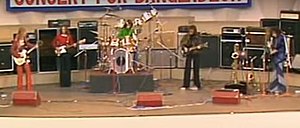Ayers Rock | |
|---|---|
 Ayers Rock performing in April 1975. From left to right: Chris Brown, Duncan McGuire, Mark Kennedy, Jimmy Doyle, and Col Loughnan | |
| Background information | |
| Also known as | Burton McGuire & Kennedy |
| Origin | Melbourne, Victoria, Australia |
| Genres | |
| Years active | 1973–1981 |
| Labels | |
| Past members |
|
Ayers Rock were an Australian rock band which formed in August 1973. Ray Burton (guitar and vocals), Mark Kennedy (drums), and Duncan McGuire (bass), members of Leo de Castro and Friends, left to form the eponymous trio of Burton, McGuire & Kennedy. They added a guitarist, Jimmy Doyle, changed their name to Ayers Rock and invited Col Loughnan (saxophones and flutes) to join. The group signed with independent label Mushroom Records in December 1973. Burton left the following March, and he was replaced by Chris Brown (guitar, vocals). With live appearances, coverage in print media and word of mouth, the group had a high national profile despite little radio airplay, and journalists praised their musicianship, music, and live energy.
The band's first album, Big Red Rock (November 1974), received positive reviews and peaked at number 32 on the Australian Kent Music Report album chart. It featured mainstream rock and three longer, instrumental tracks which introduced progressive styles, including jazz fusion. Label owner Michael Gudinski promoted Ayers Rock in Los Angeles, and they signed with A&M Records, the first Mushroom Records artists to sign with an international label. The United States release of Big Red Rock in February 1975 was followed by a tour there, later that year. The band played to large crowds, supporting major international artists (including Bachman–Turner Overdrive) before 35,000 people – the first Australian band to perform in large US stadiums. Ayers Rock were named 1975 Musicians of the Year on RAM's "New Year's Honors List". Kennedy left before their second album, Beyond (April 1976, recorded at the Record Plant in Los Angeles), was released. The album blended a number of music genres and had a positive critical reception, charting at number 50. The band toured the US again; Loughnan remained there, and Ayers Rock temporarily broke up in August 1976.
A year later, Doyle and Brown recruited members for a new lineup, including Andy Cowan (keyboards and vocals) and Hamish Stuart (drums). In 1980, they released their third album, Hotspell, on their own Red Rock Records label. This album had a soft-rock style, with sophisticated arrangements and featured keyboards. It failed to chart, and the group permanently disbanded in 1981. Although Ayers Rock's first two albums were successful in Australia, none of their six singles charted. During their early years (from 1973 to 1976), the group were praised by local media for their music, stylistic diversity, use of technology, and the energy of their live performances. Ayers Rock received positive reviews in Billboard and Cashbox. Late-1990s music historians recognised the band's talent but considered their music over-indulgent at times, failing to bridge the gap between artistic and commercial success. Duncan Kimball of Milesago.com wrote "that they never really got the chance to reach their full potential."
